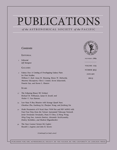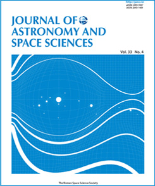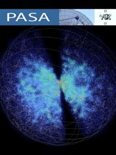
Astrophysical Bulletin
metrics 2024
Advancing Knowledge in Astronomy and Astrophysics
Introduction
Welcome to the Astrophysical Bulletin, an esteemed journal published by MAIK NAUKA/INTERPERIODICA/SPRINGER that has been contributing to the fields of Astronomy and Astrophysics since its inception in 2009. With a prominent Q3 rating in both Astronomy and Astrophysics and Instrumentation, this journal is designed to foster an understanding of astronomical phenomena through comprehensive research articles and groundbreaking discoveries. While currently not offering open access, it remains a vital resource for researchers and professionals looking to stay informed on the latest advances in the field, featuring a compelling selection of peer-reviewed studies that underscore its relevance and impact. The Astrophysical Bulletin ranks impressively in Scopus, making it a trusted platform for disseminating vital knowledge and new insights into our universe.
Metrics 2024
 0.35
0.35 1.30
1.30 1.00
1.00 23
23Metrics History
Rank 2024
Scopus
IF (Web Of Science)
JCI (Web Of Science)
Quartile History
Similar Journals

Open Astronomy
Connecting Minds Through Open Access Astronomy.Open Astronomy is a pioneering journal dedicated to the expansive field of astronomy and astrophysics, published by De Gruyter Poland Sp. z o.o. since 2016. This Open Access journal aims to facilitate the dissemination of high-quality research and stimulate scholarly dialogue among researchers, professionals, and students on a global scale. With a commitment to fostering the accessibility of academic knowledge, Open Astronomy has established itself within reputable categories, achieving a Q3 ranking in Astronomy and Astrophysics and a Q4 position in Space and Planetary Science for 2023. The journal also ranks 66th out of 90 in the Astronomy and Astrophysics category and 84th out of 104 in Space and Planetary Science according to Scopus metrics, indicating its growing influence in the scientific community. Based in Warsaw, Poland, Open Astronomy invites contributions that explore novel discoveries, innovative methodologies, and theoretical advances in the field, making it a vital resource for anyone passionate about the cosmos.

REVISTA MEXICANA DE ASTRONOMIA Y ASTROFISICA
Exploring the Depths of Space and TimeRevista Mexicana de Astronomía y Astrofísica, published by the Universidad Nacional Autónoma de México (INSTITUTO DE ASTRONOMÍA), is a prominent academic journal dedicated to advancing the knowledge and understanding of astronomy and astrophysics. As a Q3-ranked journal in both Astronomy and Astrophysics, and Space and Planetary Science in 2023, it serves as an invaluable platform for researchers and professionals within these fields. With an ISSN of 0185-1101, this journal seeks to foster innovative research and dialogue among scholars, presenting groundbreaking studies spanning from theoretical astrophysics to observational astronomy. Although it does not operate under an open-access model, the journal remains vital for its contributions to scientific literature from Mexico, with articles converging over several decades from 1996 to 2024. By offering insights into the latest findings and methodologies, Revista Mexicana de Astronomía y Astrofísica not only enhances the academic landscape but also inspires future generations of scientists and students passionate about unraveling the mysteries of the universe.

Physics
Innovating Knowledge: Your Gateway to Physics DiscoveriesPhysics, published by MDPI, is an open-access journal that commenced in 2019 and has quickly established itself as a significant contributor to the field of physics and astronomy. With a respectable impact factor and categorized in the Q2 quartile for 2023, this journal serves a broad spectrum of topics within the discipline, fostering innovative research and insights. As part of the MDPI portfolio, known for promoting high-quality, peer-reviewed research, Physics aims to provide a platform for scholars, professionals, and students to publish their findings and engage with contemporary debates in the field. The journal's accessibility, paired with its commitment to scientific excellence, ensures that research is readily available to a global audience, which is crucial for advancing knowledge and collaboration in physics. Located in the heart of Switzerland at ST ALBAN-ANLAGE 66, CH-4052 BASEL, the journal enjoys a position at the nexus of cutting-edge research and academia.

PUBLICATIONS OF THE ASTRONOMICAL SOCIETY OF THE PACIFIC
Unveiling the Mysteries of the Universe, One Publication at a TimePublications of the Astronomical Society of the Pacific is a prestigious journal dedicated to advancing the fields of Astronomy and Astrophysics, as well as Space and Planetary Science. Published by IOP Publishing Ltd, this influential journal plays a critical role in disseminating groundbreaking research and innovative findings. With an impressive Q1 ranking in both related categories according to the 2023 metrics, it is recognized among the top journals in its field. As a vital resource for researchers, professionals, and students alike, the journal covers a range of topics relevant to current astronomical research from 1996 to 2024. Although it does not offer open access options, the journal is highly regarded in academic circles, evidenced by its competitive ranking in Scopus—20th in Astronomy and Astrophysics and 26th in Space and Planetary Science. This commitment to excellence ensures that it remains an essential platform for sharing the latest insights in the ever-evolving universe.

Journal of High Energy Astrophysics
Unveiling the Unknown: Insights from High Energy AstrophysicsThe Journal of High Energy Astrophysics, published by Elsevier, is a premier platform for groundbreaking research in the fields of astrophysics and high-energy phenomena. With an ISSN of 2214-4048 and an E-ISSN of 2214-4056, this journal has quickly established itself as a leader since its inception in 2014. Operating out of the Netherlands, it is recognized for its rigorous peer-review process and high-quality publications, earning an impressive Q1 ranking across multiple domains, including Astronomy and Astrophysics, Nuclear and High Energy Physics, and Space and Planetary Science in 2023. With a Scopus rank of 12 out of 90 in the Astronomy and Astrophysics category, and being positioned in the 87th percentile, the journal plays a pivotal role in disseminating advancements and fostering collaboration among researchers, professionals, and students. Though the journal is not open access, it offers robust subscription options for institutions and individuals seeking to dive into the latest discoveries and theories in high-energy astrophysics.

Bulgarian Astronomical Journal
Exploring the Cosmos, One Study at a TimeThe Bulgarian Astronomical Journal, published by the BULGARIAN ACADEMY OF SCIENCES, INSTITUTE OF ASTRONOMY, serves as a vital platform for the dissemination of research in the field of Astronomy and Astrophysics. With the ISSN 1313-2709 and E-ISSN 1314-5592, this journal has been pivotal in showcasing original studies and advancements in astronomical sciences from 2014 and will continue to do so through 2025. Although categorized in Q4 within the ambit of Astronomy and Astrophysics, it provides essential insights and innovative findings, making significant contributions to the global academic community. Positioned in the lower quartile of Scopus rankings, recognized as #87 out of 90, it offers an opportunity for burgeoning researchers and seasoned professionals alike to engage with emerging ideas and trends in the discipline. While it currently does not feature an open access model, readers and contributors can anticipate a rich exchange of scientific knowledge that fosters collaboration within the astronomy community.

Journal of Astronomy and Space Sciences
Exploring the Cosmos, One Discovery at a Time.The Journal of Astronomy and Space Sciences, published by the Korean Space Science Society, is a premier open-access platform dedicated to advancing the fields of astronomy, astrophysics, and space sciences. Established in 1984, the journal has been instrumental in disseminating high-quality research findings, fostering collaboration among scientists globally, and providing insights into the dynamics of our universe. With an ISSN of 2093-5587 and an E-ISSN of 2093-1409, the journal has gained notable recognition, currently ranking in the Q3 quartile in Earth and Planetary Sciences and Physics and Astronomy as of 2023. Although the journal's H-Index is currently unspecified, its commitment to rigorous peer-review processes and open-access availability ensures that groundbreaking research is accessible to a wide audience. Based in Seoul, South Korea, the journal is poised to continue supporting innovative research through 2024 and beyond. Researchers, professionals, and students alike will find valuable resources and opportunities within its pages, further establishing this journal as a crucial resource in the exploration of the cosmos.

Journal of Cosmology and Astroparticle Physics
Advancing Knowledge in Cosmology and BeyondThe Journal of Cosmology and Astroparticle Physics (ISSN: 1475-7516) is a premier publication in the field of astronomy and astrophysics, dedicated to advancing our understanding of the cosmos through innovative research. Published by IOP Publishing Ltd in the United Kingdom, this journal has established itself as a vital resource for researchers, professionals, and students alike, with an impressive Scopus rank of #11/90, placing it in the top 12% of its field. The journal aims to foster the dissemination of groundbreaking studies related to cosmology, dark energy, particle physics, and the universe's fundamental structure, making it a key player in shaping contemporary astrophysics discourse. With a Category Quartile of Q2 as of 2023, it continues to attract high-quality contributions that enhance scholarly dialogue. As an accessible platform, it engages a diverse audience interested in the frontiers of astrophysical research, encouraging collaboration and knowledge sharing among the global scientific community.

PUBLICATIONS OF THE ASTRONOMICAL SOCIETY OF AUSTRALIA
Elevating Understanding of Celestial Phenomena.Publications of the Astronomical Society of Australia, published by Cambridge University Press, stands as a distinguished platform for advancing knowledge in the realms of Astronomy, Astrophysics, Space, and Planetary Science. Hemmed in the United Kingdom, this journal is recognized for its outstanding contributions, reflected in its status as a Q1 journal in both Astronomy and Astrophysics, along with Space and Planetary Science categories as of 2023. With a solid impact factor, it ranks impressively at #23 within its Scopus category, firmly placing it in the competitive 75th percentile. This publication facilitates open discourse and innovative research from its inception in 1996 to the present year of 2024, providing an essential resource for researchers, professionals, and students eager to deepen their understanding of cosmic phenomena. By embracing rigorous peer-review standards and a commitment to scholarly excellence, the journal not only contributes to the scientific community but also fosters the next generation of astronomical research.

Advances in Astronomy and Space Physics
Bridging Disciplines for a Deeper Understanding of Space.Advances in Astronomy and Space Physics is an esteemed journal dedicated to the exploration and dissemination of research in the expansive fields of astronomy and space science. Published by Taras Shevchenko National University of Kyiv, this journal provides a platform for researchers, professionals, and students to share groundbreaking studies and innovations. With an ISSN of 2227-1481, it covers a wide range of subjects including astrophysics, planetary sciences, and space exploration technologies, thereby fostering interdisciplinary collaboration. Although not an Open Access journal, it maintains a commitment to high-quality, peer-reviewed content that contributes significantly to the advancement of scientific knowledge. The journal's mission is to promote sustainable practices in space research while also exploring the implications of discoveries on Earth and beyond. By maintaining rigorous publication standards, Advances in Astronomy and Space Physics aims to serve as a critical resource for those involved in the ever-evolving study of our universe.